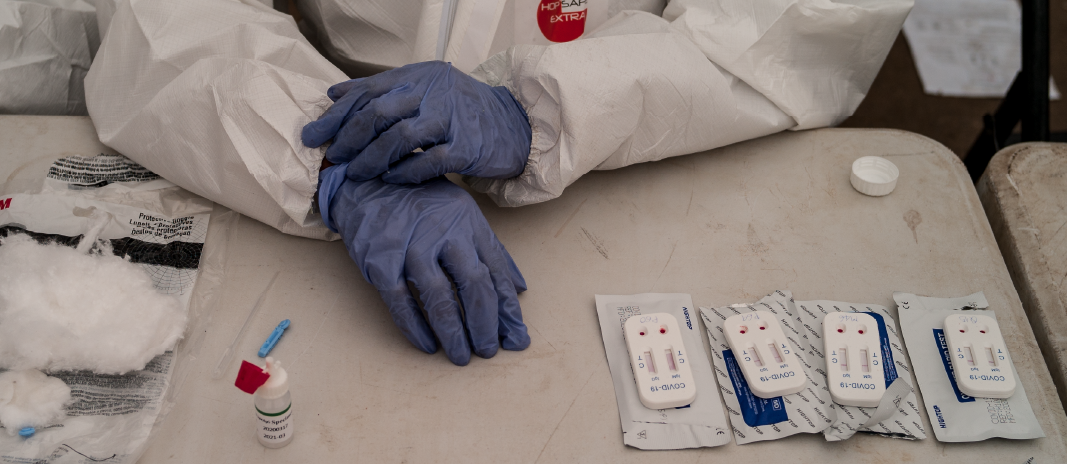 Photo: World Bank / Henitsoa Rafalia
Photo: World Bank / Henitsoa Rafalia
The COVID-19 pandemic has exposed the upsides and downsides of international trade in medical goods and services. Although global trade was a critical component in addressing the pandemic, it fell short in important ways . A new joint report from the World Bank and World Trade Organization draws lessons from the pandemic experience and proposes steps to better prepare for the next emergency.
Deepening international cooperation on trade will be critical to that effort. Key steps include negotiating tariff reductions on medical goods and greater market access in services; harmonizing national health regulations or creating international standards; and agreeing on a crisis rulebook to be deployed during an emergency.
Open trade will be increasingly important to meet growing demand for health-related goods and services, support innovation, and contain costs. Global health spending is expected to surge amid emergent infectious diseases (Figure 1), income convergence, and increasing life expectancy. Technological improvements and digitalization will make the delivery of medical products even more international, and increasingly complex global value chains will be crucial to innovation and production.
Figure 1: The yearly probability of a pandemic worse than the 1918 influenza has increased substantially since the 1600s
Yet as our study finds, trade in medical goods continues to face obstacles, especially in low- and middle-income economies. These include trade facilitation bottlenecks and restrictions on transport, logistics, and distribution services. Globally, divergent regulatory systems hinder the development, approval, and marketing of innovative vaccines, therapeutics, and diagnostics.
During the COVID-19 pandemic, trade in medical goods increased by 13.2 percent, underscoring its importance in meeting the emergency, with critical products such as face masks jumping by 481 percent. Open trade, combined with government support, spurred the rapid development of vaccines. But the concentrated nature of production, supply chain snags, and regulatory impediments contributed to shortages and an unequal distribution of supplies (Figure 2).
Figure 2: Imports of Covid-19 vaccines, by income group
Source: Staff calculations using data from the World Trade Organization and International Monetary Fund’s COVID 19 Vaccine Trade Tracker.
Governments used a range of trade and trade-related policies to bolster domestic availability of critical medical goods and services. Some of these policies detracted from global health security. Others had positive effects on the countries implementing them and their trade partners— constituting a sort of public good.
During the pandemic, more than two-thirds of countries imposed measures to restrict exports or liberalize imports of medical goods. More than 95 percent of these interventions lasted longer than three months, casting doubt on their supposedly temporary nature. The resulting disruptions to trade flows and medical supply chains boosted average trade costs by as much as 60 percent in critical products like face masks and other personal protective equipment (PPEs), increasing consumer prices and reducing availability (Figure 3).
Figure 3: Impact of COVID-19–related trade policies on trade costs of medical goods imports, the case of garments
Source: Egger, P., G. Masllorens, N. Rocha, and M. Ruta. 2022. “Estimating the Impact of Trade Policies on Trade Flows in Medical Goods.” World Bank, Washington, DC.
On the other hand, many emergency measures facilitated trade, eased regulatory bottlenecks, and promoted the diffusion of health technologies. For example, countries expedited a transition from paper-based to electronic documents requested at the border and activated emergency-use authorization to fast-track the approval of vaccines and other goods. Government subsidies supported the discovery and production of vaccines and medicines, benefitting people worldwide.
But how can trade be leveraged to improve global health security? One way is through multilateral agreements. Regulatory cooperation can strengthen the resilience of supply chains and reduce the risks of illicit trade . Trade agreements can facilitate the recognition of foreign qualifications of medical-service suppliers. Flexibility in intellectual property regimes can encourage sharing technology and know-how needed to develop new therapeutics and vaccines. In addition, trade agreements could:
-
Include commitments to limit the duration of restrictions on exports of critical goods during a pandemic; ensure that trade is not interrupted for countries in need; and consult with other economies to assess the adverse impact of measures on partners.
-
Envision ways to coordinate subsidies for crisis-related medical goods and develop joint purchasing tools to aggregate demand between countries in a crisis.
Cooperation beyond trade agreements will also be needed. Governments and international organizations such as the World Bank should take steps aiming at improving:
-
Diversification. Create mechanisms to improve access to vaccines and other essential products in low-income countries and expand supply and distribution capacity. This could include building manufacturing facilities in low- and middle-income countries with a latent comparative advantage whose relatively small populations reduce the risk of host-country intervention to meet domestic needs.
-
Information. Establish a global information clearinghouse to support production of critical medical products to serve as a platform for companies to report bottlenecks, improve visibility on production capacity and distribution, and identify measures to respond to the pandemic.
-
Regulation. Support the efficiency and equity of health markets by strengthening international standardization; bolstering the capacity of national regulatory agencies; developing good-practice policy frameworks for public procurement during crises; and working with the private sector to encourage technology transfer and expand global emergency response capacity.
COVID-19—the worst pandemic in a century and claiming millions of lives—revealed the strengths and weaknesses of global trade. It is important to learn from these lessons to ensure that trade works for everyone . To accomplish this, deepening cooperation will be needed – both to prepare the health-care system for a future emergency and to design responses that are fast, efficient, and fair.






Join the Conversation